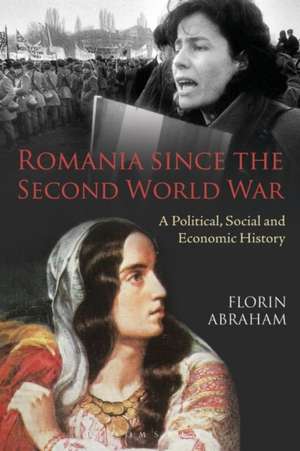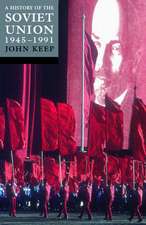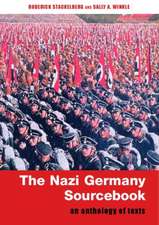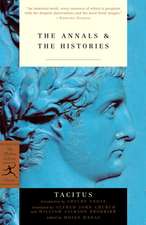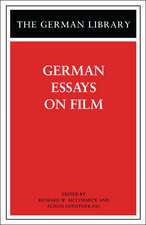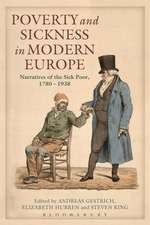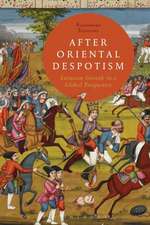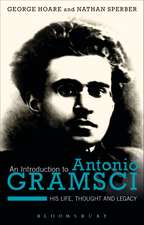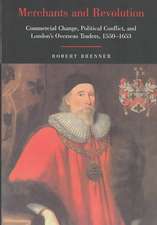Romania since the Second World War: A Political, Social and Economic History
Autor Florin Abrahamen Limba Engleză Paperback – 16 noi 2016
| Toate formatele și edițiile | Preț | Express |
|---|---|---|
| Paperback (1) | 202.22 lei 6-8 săpt. | |
| Bloomsbury Publishing – 16 noi 2016 | 202.22 lei 6-8 săpt. | |
| Hardback (1) | 776.58 lei 6-8 săpt. | |
| Bloomsbury Publishing – 16 noi 2016 | 776.58 lei 6-8 săpt. |
Preț: 202.22 lei
Preț vechi: 232.87 lei
-13% Nou
Puncte Express: 303
Preț estimativ în valută:
38.70€ • 40.35$ • 32.16£
38.70€ • 40.35$ • 32.16£
Carte tipărită la comandă
Livrare economică 21 martie-04 aprilie
Preluare comenzi: 021 569.72.76
Specificații
ISBN-13: 9781472534187
ISBN-10: 1472534182
Pagini: 360
Dimensiuni: 156 x 234 x 19 mm
Greutate: 0.57 kg
Editura: Bloomsbury Publishing
Colecția Bloomsbury Academic
Locul publicării:London, United Kingdom
ISBN-10: 1472534182
Pagini: 360
Dimensiuni: 156 x 234 x 19 mm
Greutate: 0.57 kg
Editura: Bloomsbury Publishing
Colecția Bloomsbury Academic
Locul publicării:London, United Kingdom
Caracteristici
First book covering Romania under communism until now, with elements of change and continuity analysed
Notă biografică
Florin Abraham is Senior Researcher at the National Institute for the Study of Totalitarianism at The Romanian Academy and Lecturer at The National University of Political Studies and Public Administration, Romania.
Cuprins
Introduction1. Under the Sign of Three Dictatorships (1938-1944)PART I: Communism2. The Establishment of the Communist Regime (1944-1947) 3. The Gheorghiu-Dej Era (1948-1965)4. The Nicolae Caeusescu Regime (1965-1989)5. Institutions of 'Legitimate Violence'6. Society Crushed by Tyranny7. The Economy8. The Fall of CommunismPART II: Return to Democracy: Lost in Transitions9. Political Parties10. Political Institutions11. Main Public Policies12. Foreign Policy and Euro-Atlantic Integration13. The Rule of Law14. Society Under the Pressure of Change15. The EconomyPART III: Social and Demographic Trends16. Social and Demographic TrendsConclusionsMini-BiographiesBibliographyIndex
Recenzii
This very broad temporal and thematic scope alone makes Abraham's volume a welcome addition to the Romanian Studies collection of any individual or institutional library . [It] offers a wealth of data and facts that many readers might want to access quickly.
The book draws on a rich and diverse bibliography and has a well thought through structure. Contemporary events are always put into historical perspective, thus making it easier to discern continuity and change ... It is also worth noting the presence of topics not usually tackled in similar works (culture and arts and sport), as well as an appendix containing short biographies of historical personalities ... This is an informative, well-written and accessible book, which will be of use for a wide range of readers, from scholars and students to the general public.
This is a comprehensive and valuable study ... The thematic structure of the book means that it will serve as a useful resource for students and researchers seeking to understand specific issues as well as broader patterns of development.
Abraham, lecturer in political studies in Bucharest, provides an accessible, sophisticated, scholarly account of major trends in Romania's history since 1945 . Coverage of the communist period (particularly the bizarre form of dynastic communism Ceausescu inflicted on Romania) is admirable, but the author's greatest contribution is the very detailed explanation of Romania's meandering political path since 1989, which takes up two-thirds of the book. Abraham discusses party politics, political institutions, foreign policy, legal developments, society, economy, and demography. Though the level of detail may seem forbidding for students, the author's clear writing makes the sometimes baffling events of the past quarter century come to life, often vividly. For anyone interested in recent historical developments in one of the EU's youngest members. Summing Up: Highly recommended. Upper-division undergraduates and above.
Florin Abraham's book is the latest contribution to a scholarly tradition represented by such esteemed authors as Ghita Ionescu, Stephen Fischer-Galati, Vlad Georgescu and Vladimir Tismaneanu. Written in an accessible style, attentive to historical sources, and covering more than half a century of Romanian political history, the book provides readers with a valuable and insightful foray into a very complex period in modern European and global history. It has immediate relevance for all of us interested in twentieth century political history, and beyond.
Abraham's book triggers the reader's comprehension of the difficulties Romania had to overcome during transformation. Even experts will benefit from this book. Abraham takes a broad look at Romania today and quite pointedly takes a stand, touching on numerous subjects: political institutions, parties, the educational system, churches, economic interrelations, foreign policy and demographic development. The story of the recurrent violent social protest after 1989 is especially interesting. Abraham describes the widespread insecurity in the country, the split in Romanian society and the tendency to authoritarian solutions. A committed plea to face the complexity of the present!
The book draws on a rich and diverse bibliography and has a well thought through structure. Contemporary events are always put into historical perspective, thus making it easier to discern continuity and change ... It is also worth noting the presence of topics not usually tackled in similar works (culture and arts and sport), as well as an appendix containing short biographies of historical personalities ... This is an informative, well-written and accessible book, which will be of use for a wide range of readers, from scholars and students to the general public.
This is a comprehensive and valuable study ... The thematic structure of the book means that it will serve as a useful resource for students and researchers seeking to understand specific issues as well as broader patterns of development.
Abraham, lecturer in political studies in Bucharest, provides an accessible, sophisticated, scholarly account of major trends in Romania's history since 1945 . Coverage of the communist period (particularly the bizarre form of dynastic communism Ceausescu inflicted on Romania) is admirable, but the author's greatest contribution is the very detailed explanation of Romania's meandering political path since 1989, which takes up two-thirds of the book. Abraham discusses party politics, political institutions, foreign policy, legal developments, society, economy, and demography. Though the level of detail may seem forbidding for students, the author's clear writing makes the sometimes baffling events of the past quarter century come to life, often vividly. For anyone interested in recent historical developments in one of the EU's youngest members. Summing Up: Highly recommended. Upper-division undergraduates and above.
Florin Abraham's book is the latest contribution to a scholarly tradition represented by such esteemed authors as Ghita Ionescu, Stephen Fischer-Galati, Vlad Georgescu and Vladimir Tismaneanu. Written in an accessible style, attentive to historical sources, and covering more than half a century of Romanian political history, the book provides readers with a valuable and insightful foray into a very complex period in modern European and global history. It has immediate relevance for all of us interested in twentieth century political history, and beyond.
Abraham's book triggers the reader's comprehension of the difficulties Romania had to overcome during transformation. Even experts will benefit from this book. Abraham takes a broad look at Romania today and quite pointedly takes a stand, touching on numerous subjects: political institutions, parties, the educational system, churches, economic interrelations, foreign policy and demographic development. The story of the recurrent violent social protest after 1989 is especially interesting. Abraham describes the widespread insecurity in the country, the split in Romanian society and the tendency to authoritarian solutions. A committed plea to face the complexity of the present!
